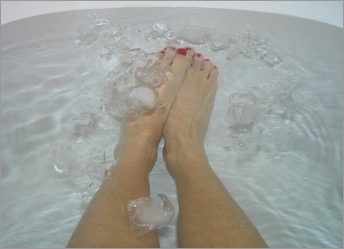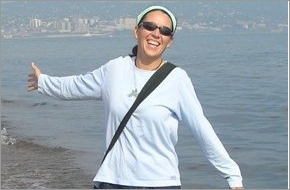 | ||
| ||||||||
By Nadine Currie Jackson
One good way to treat Delayed Onset Muscle Soreness is with massage. After a hard skate do you sometimes feel like the Tin Man from the Wizard of Oz? Hardly able to move? Your muscles tight and screaming? You've got a skating hangover — also known as Delayed Muscle Onset Soreness, or DOMS. What's going on? When you push yourself hard in anything physical, the exertion rips microscopic tears in the muscles involved. This typically happens when you start a new exercise routine or push your muscles beyond what they are used to. The result is pain, usually low-grade, dull and achy, which temporarily limits your range of motion and may cause weakness. What to do about DOMS? This part is easy. Simply give your muscles enough time to heal and rebuild. Full recovery usually takes 24 to 48 hours. But in my experience, the healthier the person, the quicker they recover. What you eat after your workout (post-workout nutrition) also plays a role. If you give your body the right foods — proteins and carbs — after a workout, it has the building blocks to rebuild.
An ice bath: do it yourself cure for soreness. Another thing that helps is to relax your stressed muscles. This increases blood flow to the muscles, which speeds healing. You can relax your skate muscles by going swimming, doing some yoga or getting a massage. Even a light skate can help if you take it easy. My favorite home remedy is an ice bath, which has become a regular part of my training routine. I've found I can race on two days back to back — and even go faster the second day — if I take an ice bath at the end of the first. You are not doomed by DOMS You needn't dread Delayed Muscle Onset Soreness. It's actually a good sign that you are experiencing it. It means you're working your muscles hard. Of course, if the soreness is debilitating and prevents you from going about your life, something's wrong. Most likely, you're training too hard and need to take it down a notch. (For real! If you don't, you may be headed toward a serious injury.)
Delayed Muscle Onset Soreness should clear up within three days. If it doesn't, check with your doctor to make sure there's nothing else going on. Listen to your pain. Remember that top athletes aren't necessarily the most talented; they're the ones that listen to their bodies and know the difference between good pain and the kind that tears them down. Nov. 6, 2009
---
Related reading: • Skate Tip of the Week Archive
...
Copyright © 2009 Inline Planet | ||||||||




